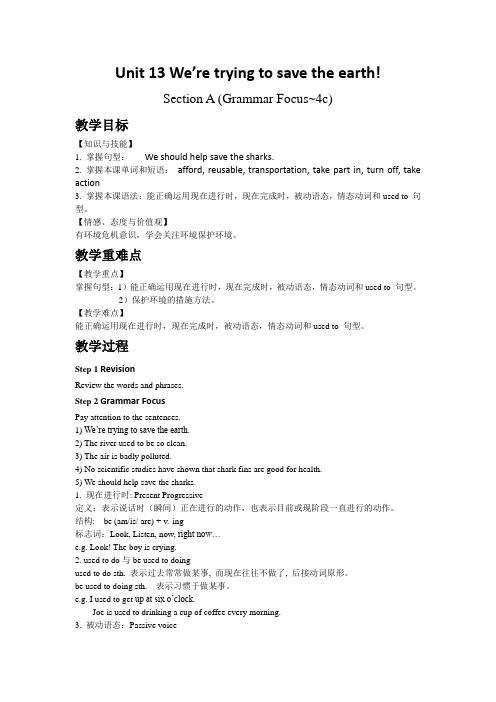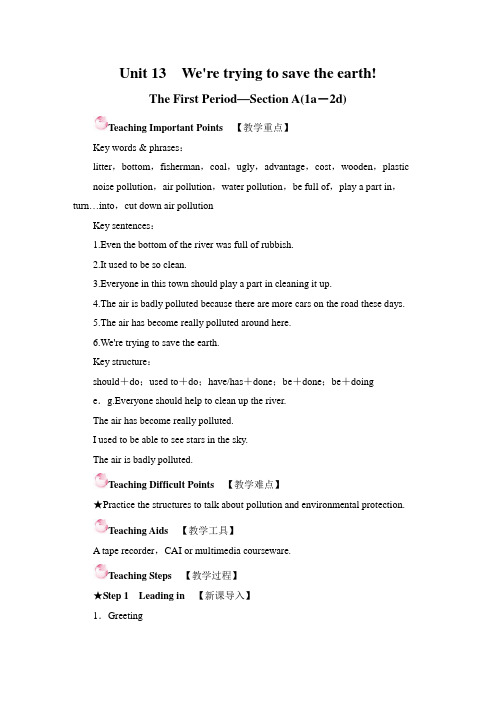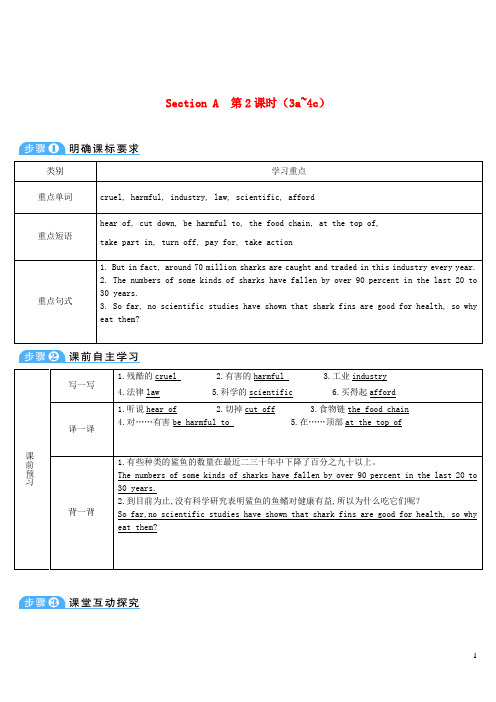人教版九年级英语下册 Unit 13 Section A(3a-4c)教案
- 格式:doc
- 大小:43.50 KB
- 文档页数:5

Unit 13 We’re trying to save the earth!Section A (Grammar Focus~4c)教学目标【知识与技能】1. 掌握句型:We should help save the sharks.2. 掌握本课单词和短语:afford, reusable, transportation, take part in, turn off, take action3. 掌握本课语法:能正确运用现在进行时,现在完成时,被动语态,情态动词和used to 句型。
【情感、态度与价值观】有环境危机意识,学会关注环境保护环境。
教学重难点【教学重点】掌握句型:1)能正确运用现在进行时,现在完成时,被动语态,情态动词和used to 句型。
2)保护环境的措施方法。
【教学难点】能正确运用现在进行时,现在完成时,被动语态,情态动词和used to 句型。
教学过程Step 1 RevisionReview the words and phrases.Step 2 Grammar FocusPay attention to the sentences.1) We’re trying to save the earth.2) The river used to be so clean.3) The air is badly polluted.4) No scientific studies have shown that shark fins are good for health.5) We should help save the sharks.1. 现在进行时: Present Progressive定义:表示说话时(瞬间)正在进行的动作,也表示目前或现阶段一直进行的动作。
结构: be (am/is/ are) + v.-ing标志词:Look, Listen, now, right now…e.g. Look! The boy is crying.2. used to do与be used to doingused to do sth. 表示过去常常做某事, 而现在往往不做了, 后接动词原形。

Unit 13We're trying to save the earth!The First Period—Section A(1a-2d)Teaching Important Points【教学重点】Key words & phrases:litter,bottom,fisherman,coal,ugly,advantage,cost,wooden,plastic noise pollution,air pollution,water pollution,be full of,play a part in,turn…into,cut down air pollutionKey sentences:1.Even the bottom of the river was full of rubbish.2.It used to be so clean.3.Everyone in this town should play a part in cleaning it up.4.The air is badly polluted because there are more cars on the road these days.5.The air has become really polluted around here.6.We're trying to save the earth.Key structure:should+do;used to+do;have/has+done;be+done;be+doinge.g.Everyone should help to clean up the river.The air has become really polluted.I used to be able to see stars in the sky.The air is badly polluted.Teaching Difficult Points【教学难点】★Practice the structures to talk about pollution and environmental protection.Teaching Aids【教学工具】A tape recorder,CAI or multimedia courseware.Teaching Steps【教学过程】★Step 1Leading in【新课导入】1.Greeting2.Discussion and reviewDiscuss with the students,like this:T:What kinds of pollution are there these days?S:…T:What causes the pollution?S:…3.Review the words and expressions about the topic.★Step 2Cooperative inquiry【合作探究】1.Finish the task in 1a①Show pictures or play videos about pollution and talk about the pollution.②Read these phrases in 1a.Look at the pictures in 1a and say what they see in the pictures.Write down the words and add more words.③Ask students to say out their words in each kind of pollution.2.Finish the task in 1b①Read the instructions.Get the students to read the contents in the chart and think of what they will fill in the blanks.②Play the recording for the first time.Students listen and fill in the words.③Play the recording a second time.Ask them to check the answers.Then ask the questions.Students answer with full sentences.④Ask more questions to help students learn more details.Then play the recording for the students to role-pay the conversation.3.Finish the task in 1c①Show the key words of the conversation.Ask students to retell the contents in the chart.Like this:What:dirty;bottom,rubbish;fishWhy:littering,putting wasteHow:write to,close down;help to clean up②Read aloud the model dialogue in 1c.Then in pairs,do the oral practice with more words.③Ask two pairs to perform in class.4.Finish the tasks in 2a-2b①Use PPT or pictures to show the four kinds of pollution.Get the groups of students to have a competition to say words about the pollution one by one.land pollution:…air pollution:…noise pollution:…water pollution:…②Get the students to write down these words in their notebooks.③Play the recording for the first time.Students listen and circle the kinds of pollution.Check answers with the class.④Read the sentences in 2b.Predict the contents they will fill in.Play the recording.Students listen and complete the sentences.⑤Play the recording again.Check the answers with the whole class.5.Finish the task in 2c①Read the sample conversation in 2c.Then Read the listening materials and discuss in pairs what causes the two kinds of pollution.②Students work in pairs,making dialogues.③Ask three pairs to role-play their conversations to the class.6.Finish the task in 2d①Talk about the picture in 2d.Ask:What are your ideas for solving the air pollution/waste pollution problem?Present the new words in the conversation.Such as,coal,advantage,wooden,plastic,takeaway,bin,…②Read the conversation in 2d quickly.Find out the problems about environmental pollution in the dialogue.③Read the conversation again.Ask the students to find the ways to solve the problems of air and waste pollution.④Read aloud the conversation by the recording.⑤Learn the useful expressions:What are your ideas for doing…To cut down air pollution,we should…So together,our actions can make a difference and…⑥Role-play or read the conversation in pairs until fluently.★Step 3Homework1.What are your ideas for solving the waste pollution problem?2.Write the words about the four kinds of pollution.3.Translate the following sentences into English.(1)我们正在想办法拯救地球。


九年级英语全册Unit13SectionA3a-4c教案(新版)人教新目标版We’re trying to save the earth教学目标知识与技能:1.T arget language:No scientific studies have shown that shark fins are good for health.The number of some kinds of sharks have fallen be over 90 percent in the last 20 to 30 years.2.Grammar: Present perfect3.Words and expressions;be harmful to, at the top of, the food chain, take part in, turn off, pay for, take action 过程与方法:According to finishing some tasks to train students’integrating skills and train the ability of expressing students’own opinions.情感态度价值观:Animals are our friends.We must know how to love them and how to protect them.That way, It is good for both animals and us.教学重难点Target LanguageHow to improve students’integrating skills.教学方法练习法,讲授法学习方法小组合作,操练对话教学准备多媒体课件,教学过程设计意图3a. To give Ss practice in reading for specific information.Learning more about sharksAsk Ss to do some additional research to find out more about sharks before this This will enable Ss tolesson.3b. To give Ss the opport unity to review the use ofconjunctions.Shark fin soup is a Chinese delicacy that is popular not only in China, but also among the Chinese population in other countries like Singapore and Malaysia. Review of conjunctions ○s o: used to say that something is a result of something else that has just been mentioned.e.g. I was tired, so I decided to take a map.○although: used to contrast one part of a sentence with another, has the effect of making the main idea in the sentence seem surprising or unexpected. e.g. Although she studied hard, she did not pass the exam.○if: used to talk about the circumstances in which something else might happen; gives the condition for something else to happen.e.g. If you study hard, you will do well.○but: used to contrast two parts of a sentence and show that they are opposite or very different in meaning.e.g. The children stopped plying when they heard the bell.4c. To prompt Ss to think about ways of protecting the environment.To reinforce the target language for talking about environmental protection. Let’s talk about …Make a list of things that people can do to help protect the environment. have a better understandin g and greater knowledge about sharks.板书设计Unit 13 we’re trying to save the earthSection A 3a ~ 4cNo scientific studies have shown that shark fins are good for health.The number of some kinds of sharks have fallen be over 90 percent in the last 20 to 30 years.教后反思。


Section A 第2课时(3a~4c)类别学习重点重点单词cruel, harmful, industry, law, scientific, afford重点短语hear of, cut down, be harmful to, the food chain, at the top of, take part in, turn off, pay for, take action重点句式1. But in fact, around 70 million sharks are caught and traded in this industry every year.2. The numbers of some kinds of sharks have fallen by over 90 percent in the last 20 to 30 years.3. So far, no scientific studies have shown that shark fins are good for health, so why eat them?课前预习写一写1.残酷的cruel2.有害的harmful3.工业industry4.法律law5.科学的scientific6.买得起afford译一译1.听说hear of2.切掉cut off3.食物链the food chain4.对……有害be harmful to5.在……顶部at the top of背一背1.有些种类的鲨鱼的数量在最近二三十年中下降了百分之九十以上。
The numbers of some kinds of sharks have fallen by over 90 percent in the last 20 to30 years.2.到目前为止,没有科学研究表明鲨鱼的鱼鳍对健康有益,所以为什么吃它们呢?So far,no scientific studies have shown that shark fins are good for health, so whyeat them?新课展示3.take part intake part in意为“参加”,其后接名词或动名词。
Unit 13We’re trying to save the earth!Period 3 Section A (3a~4c) P99-100Teaching and learning Goals:一、功能:能谈论环境污染和环境保护问题(Be able to talk about pollution and environment protection)二、词汇和常用表达:1.能正确使用下列词汇shark fin cruel harmful at the top of chain industry law scientific afford reusable transportation2.能正确使用下列常用表达be harmful to, at top of, the food chain, take part in, can’t afford to do, turn off, pay for, take action三、文化知识:了解人类捕捉鲨鱼获取鱼翅,破坏环境污染问题并呼吁人们保护鲨鱼(Understanding human capture sharks for shark's fin, the destruction of the environment pollution and called on people to protect sharks)Teaching and learning steps:Step I. Pre-reading Activities一、PreviewRead from P99 to P100 and put the Chinese into English orally, then write them down without looking at your book.Ⅰ. 短语互译1. be harmful to2.at the top of3. 参加take in4. 关掉turn5. 付费; 付出代价for6.采取措施takeⅡ. 完成句子1. 但是你意识到每次你享受一碗鱼翅汤的时候, 你正在杀死一整只鲨鱼吗?But do you realize that a whole sharkyou enjoy a bowl of shark fin soup?2. 如果它们的数目降至过低, 会给所有海洋生物带来危险。
第 1 页 Unit13 SectionA (3a-4c ) 教案1.0 Teaching analysis 教情分析1.1 Teaching objectives 教学目标 1.1.1 Language goals 语言目标1.1.1.1 Key Words and Chunks1.1.1.1.1 For applying: cruel, harmful, be harmful to, at the top of, industry, law, scientific, take part in, afford, turn off, pay for, take action1.1.1.1.2 For comprehending: shark, fin, chain, the food chain, ecosystem, reusable, transportation1.1.1.2 Sentence Structures1) M any have heard of shark fin soup.2) B ut do you realize that you’re killing a whole shark ut do you realize that you’re killing a whole shark each time you enjoy a each time you enjoy abowl of shark fin soup?3) T his is not only cruel, but also harmful to the environment.4) S harks are at the top of harks are at the top of the food chain in the ocean’s ecosystem.the food chain in the ocean’s ecosystem.5) I f their numbers drop too low, it will bring danger to all ocean life.6) W ithout a fin, a shark can no longer swim and slowly dies.7) T he numbers of some kinds of sharks have fallen by over 90 percent in the last 20 to 30 years.8) T hey have even asked governments to develop laws to stop the sale ofshark fins. 9) S o far, no scientific studies have shown that shark fins are good for health,so why eat them?10) We We can’t can’t can’t afford to wait any longer to take action! afford to wait any longer to take action!1.1.1.3 Grammar Focus1) But do you realize that you’re killing a whole shark But do you realize that you’re killing a whole shark each time you enjoy a each time you enjoy abowl of shark fin soup? (each time 引导时间状语从句,意为“每当…”) 2) This is not only cruel, but also harmful to the environment. (notonly…but also…连接两个并列成分,意为“不仅…而且…”)3) So far, no scientific studies have shown that shark fins are good for health,so why eat them? (so far 意为“到目前为止”,是现在完成时的标志)4) Without a fin, a shark can no longer swim and slowly dies. (no longer 意为“不再”,等于not … any longer)1.1.2 Ability goals 能力目标1.1.2.1 To review the present perfect tense and the passive voice.1.1.2.2 To enable Ss to learn some of the key words and expressions in the reading passage.1.1.2.3 To cultivate Ss to read for specific ideas and the structure of the passage.1.1.3 Emotional goals 情感目标1.1.3.1 To help Ss understand the present situation of sharks.1.1.3.2 To raise Ss’ awareness of protecting animals. 1.2 Important and difficult teaching points 教学重难点1.2.1Enable Ss to learn and apply the sentence patterns. 1.2.2 Enable Ss to know the sharks are in danger.1.2.3 Guide Ss to help save the sharks.2.0 Student analysis 学情分析2.1 Fundamental State 基本情况通过本单元第一课时的学习,学生基本上激活了已有的语言知识,对本单元的话题(pollution and environmental protection )已经有所感知,对于environmental problems, how to solve air pollution, how to solve waste pollution 等内容有了更深入的学习。
Unit 13 We’re trying to save the earth
一、教学目标:
知识与技能:
1. 能正确使用下列词汇shark fin cruel harmful at the top of chain industry law scientific
afford reusable transportation
2. 能正确使用下列常用表达be harmful to, at top of, the food chain, take part in, can’t afford to do,
turn off, pay for, take action
3. 能谈论环境污染和环境保护问题
过程与方法:
通过阅读训练学生的综合语言运用能力,培养表达自己的观点的能力。
情感态度价值观:
学生通过了解人类捕捉鲨鱼获取鱼翅,破坏环境污染问题认识到保护动物的重要性。
二、教学重点与难点:
记忆重点单词及短语,复习现在完成时态
提高学生语言的综合运用能力
三、教学准备:
1、多媒体课件
2、录音机
板书设计
Unit 13 We’re trying to save the earth!
第二课时Section A (3a-4c)
No scientific studies have shown that shark fins are good for health.
The number of some kinds of sharks have fallen be over 90 percent in the last 20 to 30 years.。